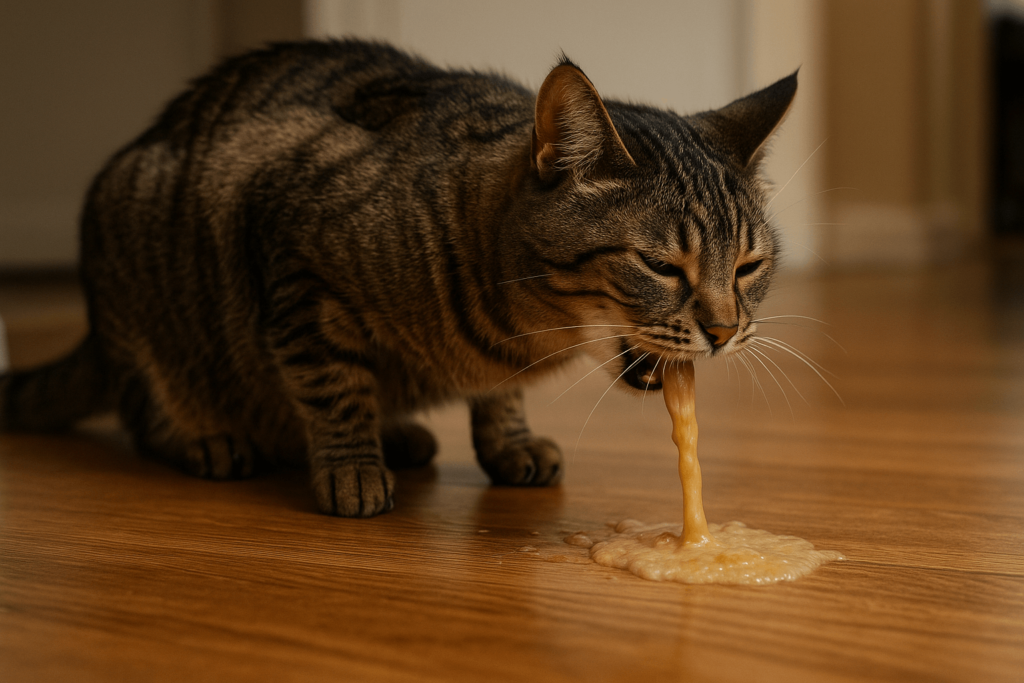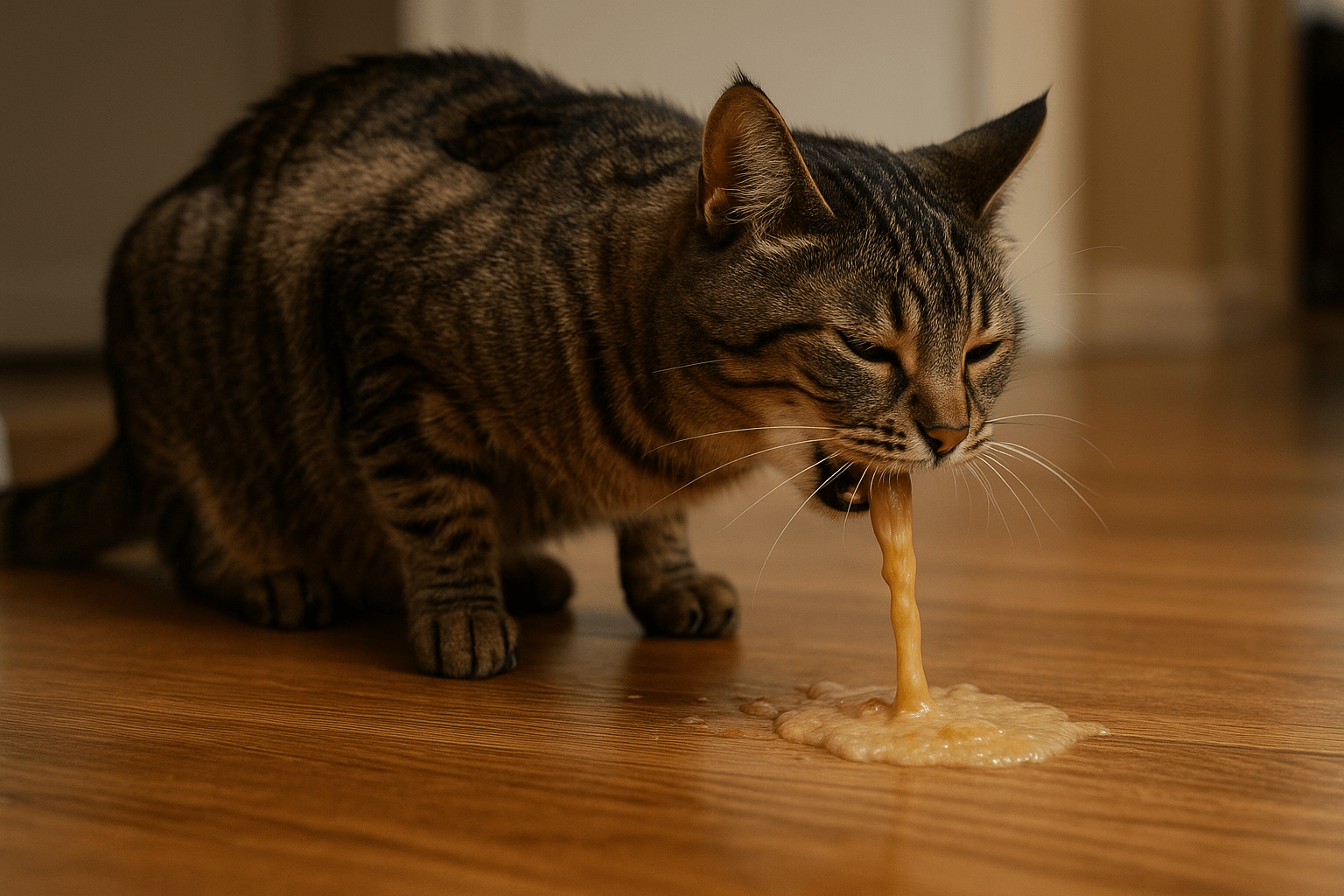Why Does My Cat Puke Every Day? Understanding the Causes and Solutions
If your cat is vomiting daily, it’s natural to feel concerned. While occasional vomiting can be normal for cats, frequent episodes may indicate an underlying issue that needs attention. From dietary habits to potential health conditions, there are several reasons why your feline friend might be experiencing this discomfort. This blog post will explore the possible causes of daily vomiting in cats, offer practical tips for managing the problem, and guide you on when to seek veterinary help. By understanding the root cause, you can take steps to ensure your cat stays happy, healthy, and comfortable.
Common Reasons Why Cats Vomit Daily
Daily vomiting in cats can stem from a variety of factors, ranging from minor issues to more serious health concerns. Identifying the cause is the first step toward finding a solution.
Hairballs:
Cats groom themselves frequently, ingesting loose fur that can accumulate in their stomachs. Hairballs are a common cause of vomiting, especially in long-haired breeds.Dietary Indiscretion:
Eating too quickly, consuming spoiled food, or trying new foods can upset your cat’s stomach and lead to vomiting.Food Allergies or Intolerances:
Some cats are sensitive to specific ingredients in their food, such as grains, dairy, or certain proteins, triggering digestive issues.Gastrointestinal Disorders:
Conditions like inflammatory bowel disease (IBD) or gastritis can cause chronic vomiting due to inflammation in the digestive tract.Parasites or Infections:
Internal parasites, such as worms, or bacterial infections can irritate your cat’s stomach, resulting in frequent vomiting.
Understanding these potential causes can help you narrow down the issue and determine the best course of action for your cat’s well-being.

Signs That Your Cat Needs Veterinary Attention
While occasional vomiting is not always alarming, persistent or severe symptoms warrant a visit to the vet. Look out for these red flags that indicate your cat may need professional care.
Blood in Vomit:
The presence of blood—whether bright red or dark and coffee-ground-like—is a sign of a serious issue that requires immediate attention.Lethargy or Weakness:
If your cat seems unusually tired, uninterested in activities, or unable to move normally, it could signal an underlying health problem.Weight Loss:
Unexplained weight loss alongside daily vomiting may point to a chronic condition like kidney disease or hyperthyroidism.Diarrhea or Constipation:
Digestive issues combined with vomiting can indicate gastrointestinal distress or systemic illness.Changes in Appetite:
A sudden refusal to eat or excessive hunger paired with vomiting should not be ignored, as it may reflect metabolic or hormonal imbalances.
Recognizing these warning signs ensures you address potential health concerns promptly, improving your cat’s chances of recovery.
Check this guide 👉Why Does My Cat Have a FUPA? Best 7 Expert Tips!
Check this guide 👉Why Does My Cat Keep Getting Fleas? Best 7 Expert Tips!
Check this guide 👉Why Does My Cat Take My Spot? Best 7 Expert Tips!
Possible Causes of Daily Vomiting | Steps to Address the Issue |
|---|---|
Hairballs | Brush your cat regularly to reduce shedding |
Dietary indiscretion | Monitor feeding habits and avoid table scraps |
Food allergies | Switch to hypoallergenic or limited-ingredient diets |
Gastrointestinal disorders | Consult a vet for diagnostic tests and treatment |
Parasites or infections | Administer deworming medication as prescribed |
How to Prevent Daily Vomiting in Cats
Preventing daily vomiting involves addressing potential triggers and making adjustments to your cat’s lifestyle. Here are some practical strategies to consider.
Regular Grooming:
Frequent brushing reduces the amount of hair your cat swallows during grooming sessions, minimizing the risk of hairball-related vomiting.Slow Feeder Bowls:
Using slow feeder bowls encourages your cat to eat at a steady pace, reducing the likelihood of regurgitation after meals.High-Quality Diet:
Opt for high-quality, easily digestible cat food formulated to meet your cat’s nutritional needs and minimize digestive upset.Hydration Support:
Ensure your cat has access to fresh water at all times. Consider wet food or water fountains to encourage hydration.Routine Vet Checkups:
Regular veterinary exams help catch early signs of health problems before they escalate into chronic issues.
By implementing these preventive measures, you can significantly reduce the frequency of vomiting episodes in your cat.
When to Try Home Remedies vs. Seeking Professional Help
Deciding whether to try home remedies or consult a vet depends on the severity and persistence of your cat’s vomiting. Here’s how to approach the situation effectively.
Mild, Infrequent Vomiting:
For isolated incidents without other symptoms, simple adjustments like changing food or grooming more often may suffice.Persistent Vomiting Over Days:
If your cat vomits daily for several days, schedule an appointment with your vet to rule out underlying conditions.Experimenting with Diet Changes:
Gradually transition to a bland or hypoallergenic diet to see if food sensitivities are contributing to the problem.Monitoring Behavior Closely:
Keep track of additional symptoms, such as appetite changes or lethargy, to provide valuable information to your vet.Avoid Self-Diagnosing Serious Issues:
While home remedies can help, never delay seeking professional advice if your cat’s condition worsens or doesn’t improve.
Balancing home care with professional guidance ensures your cat receives the appropriate level of support for their needs.
Additional Tips for Managing Hairballs
Hairballs are one of the most common culprits behind daily vomiting in cats. These tips can help minimize their impact and keep your cat’s digestive system running smoothly.
Use a Hairball-Control Formula:
Specialized cat foods and supplements contain fiber to aid in passing hairballs naturally.Provide Cat Grass:
Growing cat grass indoors gives your cat a safe way to induce vomiting and expel hairballs when necessary.Invest in a Deshedding Tool:
Tools like grooming gloves or deshedding brushes remove loose fur more effectively than traditional brushes.Encourage Playtime After Grooming:
Engage your cat in play after brushing to distract them from licking and swallowing loose fur.Consider Professional Grooming:
For long-haired breeds, professional grooming can significantly reduce shedding and hairball formation.
With consistent grooming and supportive care, you can drastically reduce hairball-related vomiting.
Dietary Adjustments to Reduce Vomiting
Making thoughtful changes to your cat’s diet can alleviate vomiting caused by food sensitivities or digestive issues.
Switch to a Limited-Ingredient Diet:
Diets with fewer ingredients help identify and eliminate allergens that may trigger vomiting.Introduce Probiotics:
Probiotic supplements promote gut health and improve digestion, reducing the risk of upset stomachs.Avoid Sudden Food Changes:
Gradually transition to new foods over 7-10 days to allow your cat’s digestive system to adjust.Eliminate Problematic Ingredients:
Common offenders like dairy, grains, or artificial additives should be avoided if suspected of causing issues.Consult a Veterinary Nutritionist:
For stubborn cases, a specialist can design a tailored diet plan to address your cat’s unique needs.
Thoughtful dietary management can often resolve vomiting linked to food sensitivities or poor digestion.
Environmental Factors Contributing to Vomiting
Sometimes, external factors in your cat’s environment can contribute to daily vomiting. Addressing these elements can create a calmer, healthier living space.
Reduce Household Stressors:
Loud noises, unfamiliar guests, or rearranged furniture can stress sensitive cats, leading to vomiting.Create Safe Spaces:
Provide cozy hiding spots or elevated perches where your cat can retreat and feel secure.Maintain Consistent Routines:
Cats thrive on predictability; sticking to regular feeding, play, and sleep schedules minimizes anxiety.Limit Access to Toxic Plants:
Certain plants, like lilies or philodendrons, can irritate your cat’s stomach if ingested. Remove them from your home.Monitor Multi-Cat Dynamics:
Tension between cats in multi-pet households can manifest as stress-induced vomiting. Ensure each cat has its own resources.
By creating a stable and enriching environment, you can reduce environmental triggers that contribute to daily vomiting.
Frequently Asked Questions About Daily Cat Vomiting
Is it normal for cats to vomit occasionally?
Yes, occasional vomiting can be normal, but daily vomiting is not and should be investigated further.
Can stress cause my cat to vomit?
Yes, stress or anxiety can trigger vomiting in sensitive cats. Identifying and addressing the source of stress can help.
What should I do if my cat vomits undigested food?
Try feeding smaller portions more frequently or using a slow feeder bowl to prevent regurgitation.
Are hairballs always harmless?
While most hairballs are harmless, frequent hairball-related vomiting may require intervention, such as specialized diets or medications.
How can I tell if my cat’s vomiting is serious?
Look for accompanying symptoms like blood in vomit, weight loss, lethargy, or changes in behavior, which indicate the need for urgent care.
Supporting Your Cat Through Daily Vomiting Challenges
Dealing with a cat that vomits every day can be stressful, but understanding the potential causes and taking proactive steps can make a significant difference. Whether the issue stems from something as simple as hairballs or as complex as a gastrointestinal disorder, addressing the root cause is key to restoring your cat’s comfort and well-being. Remember to monitor your cat closely, implement preventive measures, and seek veterinary advice when needed. With patience and care, you can help your feline companion overcome this challenge and enjoy a healthier, happier life.
Canned Pumpkin for Cat Diarrhea: Best 7 Expert Tips! Natural remedy to firm stools, soothe upset bellies, and support gut health safely.
Can a Cat Give You Scabies? Best 7 Expert Tips! Discover the truth about feline mites, human skin risks, and how to protect yourself—without panic.
Cat Flea vs Human Flea: Best 7 Expert Tips! Discover the truth about bites, species, and how to eliminate infestations for good.
Weird Cat Behaviors: Best 7 Expert Tips! Discover why cats do strange things—and how to understand, not punish, their instincts for a happier home.





